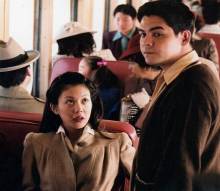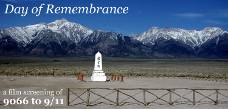
|
Archives |

2/19/2007 |
Stand Up for Justice and 9066 to 9/11 |

|
Stand Up for Justice, a 30-minute drama, tells the amazing, true story of Ralph Lazo, a sixteen-year-old Mexican/Irish American high school student, who joined his Japanese American friends on the train to the Manzanar concentration camp during World War II. It recreates the turbulent days in the Los Angeles Japanese American community after the bombing of Pearl Harbor. Ralph reacts with disbelief and anger as he observes his Nisei friend Jimmy and Jimmy’s family become the objects of racial hatred. Ralph’s feelings of friendship and loyalty toward his Japanese American friends become even stronger as he easily integrates into the fabric of Manzanar camp life.
The film, written and directed by John Esaki, is a production of Visual Communications and Nikkei for Civil Rights & Redress. |

|
9066 to 9/11 focuses on the parallels between the post-September 11 treatment of Arab Americans and Muslims in this country with treatment of Japanese Americans after the start of World War II. Revealing striking similarities, the video addresses the mistreatment of immigrants in the United States, as well as the lack of historical memory by lawmakers and the public about America’s concentration camps during World War II. This 20-minutes documentary will serve as an invaluable educational tool and a primer on the Japanese American camp experience and its relevance today.
|
|
Aiko Yoshinaga-Herzig, along with her husband Jack Herzig, played a critical role in one of the most important civil rights campaigns in recent memory. Prior to their marriage, Herzig was a single parent raising three children and working as office manager for both private and nonprofit organizations in New York City. In the 1970s, she became interested in whether the federal government had maintained files on her in the National Archives, and while none were available from recent years she did find records for the period she and her family were incarcerated at Manzanar and other concentration camps. Gradually, her personal search became an investigation and compilation of documentary material on the banishment and imprisonment of Japanese Americans who lived on the West Coast. The growing knowledge and authority in this field led to her being hired as chief researcher for the Commission on Wartime Relocation and Internment of Civilians. In that capacity, she found documents that helped shape the Commission’s report, which served as the basis of the bill for redress that was eventually approved by both Houses of Congress. She and her husband testified on key issues before the Congress and the courts, participated in symposia at the Smithsonian Institution and various universities, and served as researchers for the coram nobis cases and the class action lawsuit, Hohri v. U.S.A., initiated by the National Council for Japanese American Redress. Following the enactment of the Civil Liberties Act of 1988, they assisted the Office of Redress Administration of the Justice Department in identifying the thousands of former Japanese American camp victims as eligible for compensation. Evidentiary documentation the Herzigs discovered in the National Archives resulted in substantiating the racial bias in the government’s wartime actions toward Japanese Americans and gave the courts in the 1980s legitimate grounds to vacate the Supreme Court’s wartime convictions of the Nisei men who challenged the legality of the government’s discriminatory exclusion program.
Lane Hirabayashi received his PhD in socio-cultural anthropology from UC Berkeley and has had a distinguished career as a faculty member at San Francisco State University, University of Colorado, Boulder, and UC Riverside. In addition to receiving numerous academic awards and grants, he was recently named UCLA’s first George and Sakaye Aratani Professor of the Japanese American Internment, Redress, and Community. Hirabayashi's family is well-known in relation to the wartime incarceration and to the fields of Asian American Studies and Ethnic Studies. His uncle, Gordon, was the principal defendant in one of the major U.S. Supreme Court cases that challenged the government's decision to remove and intern the Japanese Americans (Hirabayashi v. United States 1943). It also was part of the successful coram nobis efforts of the 1980s, which included the cases of Fred Korematsu and Min Yasui. His father, Dr. James Hirabayashi, was the first Dean of the School of Ethnic Studies at San Francisco State University and an original member of the Japanese American Planning Group at the university, which designed the first curriculum in Japanese American Studies. Along with major contributions to the development of scholarship on Japanese Americans, especially their World War II experiences, Hirabayashi has been a leading scholar in Asian American Studies, Latin American Studies, Ethnic Studies, and in the comparative study of Japanese migration in the United States, Mexico, and Latin America. He has authored three books -- Cultural Capital: Mountain Zapotec Migrant Associations in Mexico City (1993), Inside an American Concentration Camp: Japanese American Resistance at Poston, Arizona (1995), and The Politics of Fieldwork: Research in an American Concentration Camp (1999) -- edited and co-edited five books and one book-length special issue of the Amerasia Journal, published over thirty articles, as well as numerous book reviews. He is currently completing two book manuscripts, one of which is a reconsideration of Japanese American resettlement after their wartime incarceration.
Edina Lekovic, as Muslim Public Affairs Council's Communications Director, acts as a spokeswoman for the American Muslim community to media outlets, government officials, interfaith leaders, academic institutions, and community groups. Lekovic has appeared on national media outlets, including CNN, BBC, MSNBC, and the History Channel. Since joining MPAC, Edina's work has also been featured in several leading newspapers, including the Wall Street Journal, Washington Times, Associated Press, Chicago Tribune, and Los Angeles Times. Lekovic has also participated in numerous national and international conferences and interfaith dialogues speaking on a variety of issues related to American Muslims. In December 2004, Lekovic represented MPAC at a United Nations seminar on "Confronting Islamophobia." In 2003, she was invited by the Malaysian government to be one of two U.S. representatives to the International Conference of Muslim Young Leaders, which served as a precursor to the annual conference of the Organization of Islamic Conference (OIC). In all settings, Lekovic works to enhance the political and social participation of the American Muslims by sharing tools and avenues for engagement that will lead to a future in which Muslims are a positive, contributing part of the American fabric.
Alan Nishio recently retired from California State University, Long Beach were he served as the Associate Vice President of Student Services. In his career as an educator and community activist, he served as a founding staff member and director of UCLA’s Asian American Studies Center, as a President of the Little Tokyo People’s Rights Organization (LTPRO), which challenged the evictions caused by the redevelopment that took place in Little Tokyo in the 1970’s, and as a founding member and a Co-Chairperson of the National Coalition of Redress/Reparations (now known as Nikkei for Civil Rights & Redress) which LTPRO joined as a founding member in 1980 and which was dedicated to obtaining redress for the forced evacuation and imprisonment of more than 120,000 Japanese Americans from the West Coast. Nishio, himself, was born in the Manzanar concentration camp. His other community service activities include serving as a board member and immediate past president of the Greater Long Beach National Conference for Community and Justice (NCCJ). He is president of the board of the Little Tokyo Service Center (LTSC), for which he has been a board member for 25 years. LTSC is a community development corporation that serves individuals living and working in downtown Los Angeles and is recognized as the leading Asian Pacific American community development corporation in the region. He is also a member of the California Japanese American Community Leadership Councils and chairs the California Japantowns Preservation Committee, which is focused on the historic preservation of the three remaining Japantowns in the United States located in Los Angeles, San Francisco and San Jose. As a result of his involvement in community activities, Nishio has been recognized with a number of awards, including the Long Beach NAACP Freedom Fund Award, the League of United Latin American Citizens Educational Services Award, the LTSC Japanese American Community Services Award, NCRR’s Fighting Spirit Award, and the NCCJ’s Humanitarian Award.
|
|
Panelists |